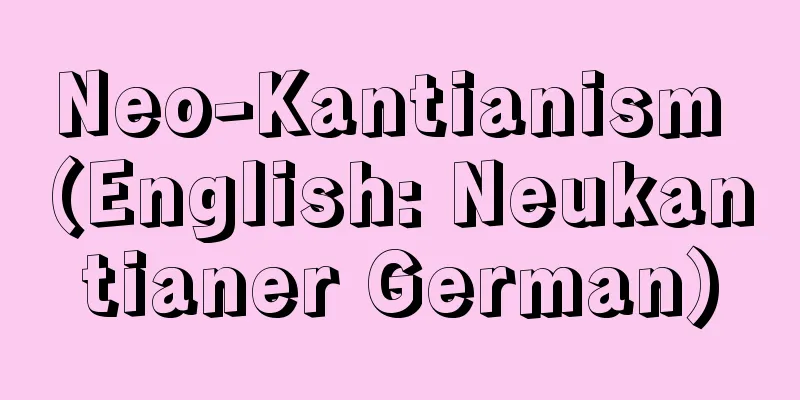Neo-Kantianism (English: Neukantianer German)

|
A school of German philosophy. By reviving Kantian philosophy, it attempted to open up a new path in philosophical thought, which had become increasingly confused before the rise of positivism and materialism that accompanied the development of empirical science from the first half of the 19th century onwards. It took a clear form in the mid-19th century with the motto "Return to Kant!" by Liebmann, Lange and others. Especially from the end of the 19th century to the beginning of the 20th century, before World War I, it became an ideological movement that had a wide and deep influence from European countries, particularly Germany, to Japan. The Neo-Kantian school generally inherited the "transcendental (a priori) method" from Kant's philosophy and bases its stance on it. In other words, instead of directly considering the objects or subjects of cognition or, more broadly, human cultural activity in general, they set their viewpoint away from them and objectify the field in which these activities take place. In this way, they take the stance of objectively considering and ascertaining these structures. This approach was taken because the common aim of this school was to open up a field in which philosophy could be established as a solid science, without, on the one hand, being dragged down by the naive objectivism of positivism and materialism, and, on the other hand, being swept away by the subjective arbitrariness of the mystical speculative philosophy that is its polar opposite. As a result, the philosophy of this school generally took the form of (1) criticism of cognition, targeting human cognition, including natural science, and (2) shared the ultimate position of focusing on the active construction of objects by human subjectivity in some sense from a transcendental perspective. Thus, the Marburg School, represented by Cohen, Natorp, and Cassirer, tended to bring to the surface the aforementioned impetus of (1), while the Southwest German School, which included Windelband, Rickert, and even Max Weber, prominently featured the impetus of (2) in the form of a foundation for the humanities and social sciences based on value philosophy. From a broad perspective, this difference could be said to be merely a difference in emphasis. After World War I, the Neo-Kantian philosophy, which had been very influential before then, rapidly lost its momentum. This is thought to be because the reality of the war and the history that followed made clear the limitations of an approach that relies on human subjectivity and the construction of objects. In Japan, from the end of the Meiji period to the Taisho period, this school, especially the Southwest German School of philosophy, was fully imported by Kuwaki Gen'yoku, Tomonaga Sanjuro, Souda Kiichiro and others, and while responding to the culturalist trend of the time, it formed the mainstream of academic philosophy for a time. The school's view of the history of Western philosophy continues to have a major influence to this day. [Megumi Sakabe] Source: Shogakukan Encyclopedia Nipponica About Encyclopedia Nipponica Information | Legend |
|
ドイツ哲学の一流派。カント哲学を復興することによって、19世紀前半以降の実証科学の発展に伴う実証主義や唯物論の台頭の前に混迷の度合いを深めていた哲学的思考に新しい道を切り開くことを試みた。19世紀なかば過ぎ、リープマン、ランゲらの「カントにかえれ!」というモットーとともに明確な形をとって現れた。とくに19世紀の終わりから20世紀初めの第一次世界大戦前の時期にかけては、ドイツを中心とするヨーロッパ諸国からわが国に至るまで、広く深い影響を与える思想運動となった。 新カント学派は、一般に、カントの哲学から「超越論的(先験的)方法」を受け継ぎ、そこに基本的立場を置く。すなわち、認識あるいは広くいって人間の文化活動一般の対象や主体を、直接に考察の対象とするのではなく、それらのいずれからも身を引き離したところに視点を設定して、それらの活動の成立する場を対象化する。こうして、それらの構造を客観的に考察し、定着するという姿勢をとるのである。この行き方がとられたのは、この学派の共通のねらいが、一方で、実証主義、唯物論の素朴な客観主義に引きずられることなく、他方でまた、その対極としての神秘的な思弁哲学の主観的恣意(しい)へと流されることもなく、哲学を確固とした学として成立させる領域を開くことにあったからである。 この結果、この学派の哲学は一般に、(1)自然科学をはじめとする人間の認識を対象とする認識批判の形をとり、(2)さらに、超越論的視点からする人間の主観による対象のなんらかの意味での能動的構成に注目する行き方を究極の立場として共有することになった。したがって、コーヘン、ナトルプ、カッシーラーを代表者とするマールブルク学派が、どちらかといえば前述の(1)の契機を表面に出し、ウィンデルバント、リッケルト、さらにマックス・ウェーバーをも含む西南ドイツ学派では、価値哲学による人文・社会科学の基礎づけという形で(2)の契機が目だってみられる。この相違は、大局的にみれば強調点の違いにすぎないともいえよう。 第一次世界大戦を境に、それ以前には大きな影響力をもっていた新カント学派の哲学は、急速にその勢いを失う。これは、この大戦とその後の歴史の現実が、人間の主観性と対象構成に依拠する行き方の限界を、おのずから明らかならしめたためと考えられる。 なお、わが国では、明治末年から大正時代にかけて、桑木厳翼(くわきげんよく)、朝永三十郎(ともながさんじゅうろう)、左右田喜一郎(そうだきいちろう)らによってこの学派、とりわけ西南ドイツ学派の哲学が本格的に移入され、時代の文化主義的風潮とも呼応しながら、一時期アカデミー哲学の主流を形成した。同学派の西洋哲学史観などは、今日までなおその大きな影響をとどめている。 [坂部 恵] 出典 小学館 日本大百科全書(ニッポニカ)日本大百科全書(ニッポニカ)について 情報 | 凡例 |
<<: Emperor's Letter - Shinkanyo
Recommend
statement
… Attaché A person who assists the head of a dipl...
Inka - Inka
〘Noun〙 ("In" means a sign or seal of app...
Stateville
…Bentham's panopticon was conceived as the mo...
Kameya Kumakichi
…In 1644, German Jesuit priest A. Kircher invente...
Ben - Gottfried Benn
German poet. Born in Mansfeld, West Prussia, as t...
Berenikē (English spelling) Berenike
…In alliance with Antigonus II of Macedonia, he f...
First-order difference - one-third
…For a constant h ≠ 0, ⊿ f ( t ) = f ( t + h ) - ...
Stump-drenched wood - Turnip Wonders
...Or, instead of pulling up the fish, they may t...
Pistol shrimp (English spelling)
...The pincers of the long-legged pistol shrimp A...
Merger agreement - Gappeiyakusho
… [Merger Procedures] Mergers involve the transfe...
Volto Santo (English spelling)
...The birthplace of composer G. Puccini. [Aichi ...
Small white
…As its name suggests, it has a black pattern on ...
coining
…The type and format of the bills are determined ...
homologous chromosomes
...somatic cells contain pairs of chromosomes tha...
Golden Rule
Golden Rule in English. The fundamental ethics of ...







![Æthelred [II] - Æthelred](/upload/images/67cb0707a9f1c.webp)

